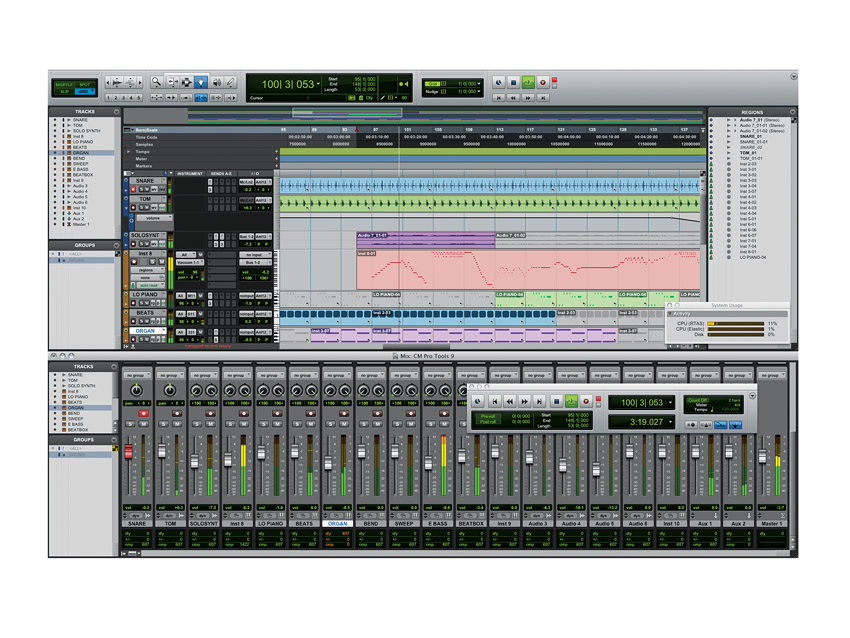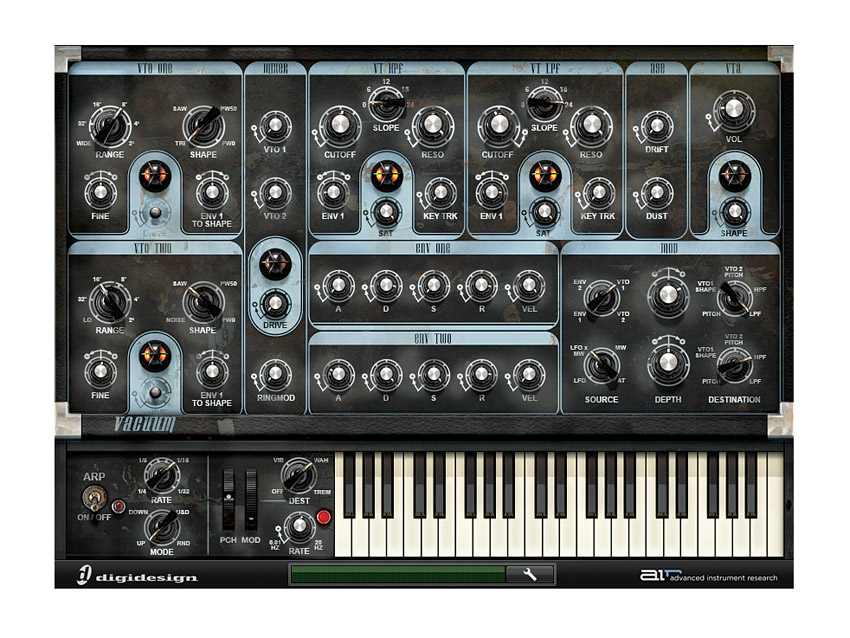MusicRadar Verdict
Not a huge update in terms of features, but the abolishment of interface reliance makes Pro Tools 9 far more attractive.
Pros
- +
Improved overall specification. Automatic delay compensation. Multichannel Beat Detective as standard. Greater hardware flexibility. Useful instruments and plug-ins.
Cons
- -
Entry price is higher. Add-ons needed for full feature-set. No offline mixdown
MusicRadar's got your back

Avid Pro Tools 9

Avid Pro Tools 9
For years, computer musicians have bemoaned the proprietary nature of Pro Tools. Unlike every other DAW, the software would only work with Avid's own audio interfaces. Pro Tools 9 marks the end of this archaic practice, putting it on an equal footing with its numerous rivals.
Pro Tools still comes in multiple varieties: HD, HD Native and the 'standard' edition that we're reviewing here. Both HD versions require Pro Tools hardware for full functionality, either to interface and process audio via TDM DSP (HD); or just interface it, using the computer's CPU for processing (HD Native).
"Although the shift is mostly positive, there are some downsides."
The third option - simply called Pro Tools 9 - is the only truly open system. It requires just the software, a PC or Mac, and a suitable audio interface (ASIO or CoreAudio), and it's this version that we're testing. You can even use it with your computer's onboard sound system - handy when on the move.
Like other all-in-one DAW packages, PT9 combines audio recording, MIDI sequencing, automation, real-time audio plug-ins, offline audio processing, elastic audio, instrument plug-ins and bundled sample content - basically everything you need to make complete pro-quality tracks.
It is, in essence, a replacement for Pro Tools LE and M-Powered (but note that v8 of the latter is still currently available). The big downer for existing users is that this will mean a paid-for upgrade, while new users are also looking at a higher entry price. In return, the spec is much better, but paid-for extras and enhancements do still exist.
Making it all better
Major improvements include a higher track count (96 mono or stereo at 44.1/48kHz), up to 32 channels of audio in/out (interface dependent), 256 buses, 512 MIDI tracks, 64 instrument tracks, 128 aux inputs, OMF/AAF/MXF support, EUCON support for Euphonix Artist/Pro devices, multitrack Beat Detective, pan law options and automatic delay compensation (ADC).
Officially, only OS X Snow Leopard and Windows 7 are supported. Third-party audio interfaces will not be officially qualified on an individual basis. Copy protection is still via iLok (and, thankfully, the boxed version includes a pre-authorised iLok).
Don't be a stranger
While some updated DAWs can feel like totally new programs, v9 is all very familiar. In fact, there are no further headline-grabbing changes. You get the same bundled six-instrument pack and additional sample content as v8.
This is a great starter set, though you'll still hanker after the full Instrument Expansion Pack.
Next up, the standard effects plug-ins (including the recent AIR effects and bundled Bomb Factory ones) cover most ground. But apart from multitrack capability being added to Beat Detective as standard, there's also not much new here.
On the upside, switching between interfaces is simple, and there is reasonable flexibility here: Mac users can use a Pro Tools Aggregate Device for combining CoreAudio interfaces.
Alas, within Pro Tools, Avid's own interfaces only use DAE drivers and so can't be aggregated. Interestingly, low-latency hardware monitoring still exists if you select an Avid interface that supports it (002, 003, Mbox Pro and Mbox Pro 2) but seems to be otherwise unavailable.
Automatic delay compensation is big news for non-HD Pro Tools and we found it worked very well, not least because it flags up the channel whose plug-ins are causing the most latency. There's also further manual adjustment should you need it, giving excellent user control.
Pro Tools still doesn't have an offline rendering mode - if you mix down a ten-minute song, it'll take ten minutes to do it, unlike most DAWs, which accelerate the process.
Newcomers should also be aware that Pro Tools uses its own plug-in format: RTAS. VST/AU aren't supported (although there is a VST wrapper available).
Small steps
Pro Tools began life as an audio recording system, and whether you're using QuickPunch to drop into record or mixing with lots of automation, it's still incredibly reliable and good at such tasks.
Audio and MIDI editing can all be done in the main edit screen, but, there's also a dedicated MIDI Editor pane, similar to other big-name DAWs.
One thing lacking is the option to play instruments from the QWERTY keyboard, and this combined with the fairly 'functional' bundled instrument set means hardened programmers will probably look elsewhere. However, if you combine recording and programming, Pro Tools' stability and sonic quality are very welcome.
Although the shift to Pro Tools 9 is mostly positive, there are some downsides. Firstly, there's no longer an equivalent option to buying cheap interfaces with Pro Tools LE included, and new v9 bundles reflect the higher price.
Next up, to compete with its nearest rivals (in terms of spec at least), you still need to buy the Complete Production Toolkit 2 (£1716) and Instrument Expansion Pack (£432).
Thirdly, the onslaught of instruments and effects courtesy of the AIR team seems to have ground to a halt for the time being. And finally, while Avid have done a reasonable job of harmonising the various versions into one unified program, comparison charts are still needed to nail down precisely what to expect from a particular setup.
Even so, in most respects, they've finally given users what they asked for, and Pro Tools can now be viewed as a direct competitor for a wide range of DAWs.
Computer Music magazine is the world’s best selling publication dedicated solely to making great music with your Mac or PC computer. Each issue it brings its lucky readers the best in cutting-edge tutorials, need-to-know, expert software reviews and even all the tools you actually need to make great music today, courtesy of our legendary CM Plugin Suite.
With its latest free update, Ableton has finally turned Note into the app I always wanted it to be
Technically capable, but struggle to make your tunes sound musical? 5 simple music theory hacks to make your tracks stand out
"Despite its size, it delivers impressive audio quality and premium functions as well as featuring a good selection of inspired sounds": Roland GO:Piano 88PX review










